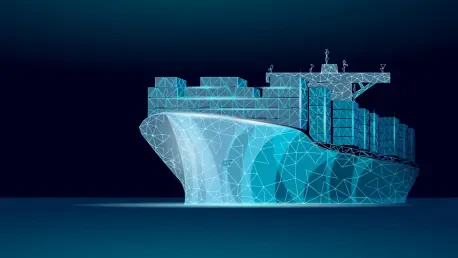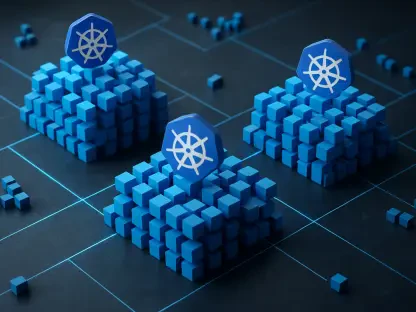Maersk’s innovative OneWireless initiative is poised to bring a paradigm shift to maritime logistics with the implementation of a sophisticated LTE connectivity platform throughout its fleet. By championing this monumental leap in connectivity, Maersk aims to turbocharge cargo tracking and significantly optimize operational efficiency. The plan involves establishing a private LTE network on 450 vessels, effectively replacing outdated 2G systems with state-of-the-art IoT solutions. This transition is facilitated through collaboration with a host of technology partners, setting the stage for smarter and more streamlined maritime logistics solutions.
Unpacking the OneWireless Initiative
Technological Shift and Consortium Collaboration
The OneWireless initiative represents a monumental transformation for Maersk, ushering in an era where traditional 2G communication paradigms are left behind in favor of a comprehensive LTE network. This cutting-edge technological stride is made possible through the concerted efforts of a consortium of notable technology firms, including powerhouses like Onomondo and Nokia. These industry leaders bring unrivaled expertise in IoT and network technologies, working collaboratively to construct an integrated communication infrastructure for Maersk. This ecosystem is designed to adapt seamlessly to various wireless technologies, including NB-IoT, Cat-M, and LTE broadband, ensuring that the groundwork is set for future network upgrades to 5G.
The integration of these advanced technologies not only propels operational efficiency but also ensures sustained reliability and adaptability across diverse maritime environments. The technological upgrade is likened to leaping from 2G to 4G in the terrestrial cellular world, positioning Maersk as a leader in maritime connectivity innovation. By securing this technological edge, Maersk is primed to redefine standards in the shipping industry, promising higher levels of service quality, reduced delays, and improved logistical operations.
Strategic Goals and Implementation Needs
At the core of the OneWireless initiative lies the development of a ‘bring-your-own IoT’ framework, simplifying logistics for Maersk’s widespread clientele. This strategy aims to provide standard global solutions that guarantee uninterrupted connectivity across geographic divides. By focusing on superior cargo tracking capabilities, Maersk ensures that its operations remain reliable, whether at sea or at port. These enhancements are perfectly aligned with the company’s overarching strategic goals, aspiring for greater transparency and heightened efficiency within the logistics domain.
This BYOIoT framework holds the potential to modernize the existing maritime supply chain ecosystem. It aims to eliminate logistical silos, offering continuous monitoring platforms that enhance visibility throughout all stages of transit. In turn, this creates a win-win situation for all stakeholders involved, allowing Maersk and its clients to maintain impeccable performance records. Through these meticulous processes, Maersk reinforces its commitment to pioneering intelligent logistics solutions, charting a path toward more data-driven and optimized shipping practices.
Partners and Their Roles
Onomondo’s Cutting-Edge Network Solutions
In the realm of network solutions, Onomondo emerges as a pivotal player by deploying what is likely to be recognized as the largest private LTE network across maritime channels. The strategy involves the installation of a private LTE core network on each vessel, ensuring comprehensive coverage whether on the high seas or near coastal areas. Onomondo’s cutting-edge solutions facilitate seamless transitions between private and public networks, addressing prevalent communication gaps and revolutionizing maritime connectivity.
This seamless network switching capability is instrumental in mitigating communication blind spots that have historically challenged maritime logistics. By leveraging MVNO agreements with global operators, Onomondo eliminates the need for SIM swaps or manual configurations, fostering smoother interactions with international maritime networks. As a result, Maersk’s fleet benefits from uninterrupted communications, significantly enhancing real-time data exchange essential for consistent cargo tracking and quality assessments.
Nokia’s Experience in Private Networks
Nokia leverages its extensive experience in providing robust private network solutions, playing a crucial role in Maersk’s transformation. Nokia deploys small cells and advanced radio equipment across Maersk’s fleet, supplementing satellite communications for efficient backhaul operations. By incorporating its sophisticated network management system, Nokia ensures streamlined monitoring and optimized performance across the vessels, reinforcing Maersk’s maritime communication framework.
Integrating Nokia’s technology enables real-time diagnostics and predictive maintenance, while its comprehensive suite of equipment, such as Shikra Remote Radio Heads and custom antennas, fortifies Maersk’s maritime capabilities. This collaboration results in robust and dependable maritime communication infrastructure, empowering Maersk to tackle modern-day logistic challenges with agility. Ultimately, Nokia’s role exemplifies its commitment to providing premium-grade network solutions that significantly elevate the maritime sector.
Efficient Operations Through Technology
Zededa’s Edge Computing Advantage
Zededa introduces a layer of intelligence to maritime logistics with its cutting-edge edge computing platform, addressing the complexities of remote maritime environments with finesse. By offering centralized control over the fleet’s edge devices, Zededa’s solution enables seamless application deployment and updates across vessels without the need for onboard IT personnel. This feature ensures high performance levels while simplifying operations and maintenance procedures within maritime settings.
The agility offered by this edge computing solution allows for local data processing, reducing latency and enabling real-time decision-making capabilities vital for efficient maritime operations. Zededa’s platform tackles challenges related to connectivity interruptions by ensuring seamless data integration, promoting uninterrupted communications throughout distant regions. In essence, this ensures that Maersk can maintain sophisticated fleet operations with precision and minimal disruption.
IoT and Networking Advances
Maersk’s groundbreaking OneWireless initiative is set to revolutionize maritime logistics by introducing a cutting-edge LTE connectivity platform across its fleet. This strategic move is aimed at drastically improving cargo tracking and enhancing operational effectiveness. Through the plan, Maersk intends to develop a private LTE network on 450 ships, phasing out antiquated 2G systems, and implementing advanced IoT technologies. Collaborative efforts with numerous tech partners are propelling this transition, laying the groundwork for smarter, more efficient logistical operations at sea. The initiative represents a significant technological leap, offering a wealth of benefits, including real-time data transmission, increased automation, and better resource allocation, which collectively promise to transform the shipping industry. By embracing this advanced connectivity, Maersk positions itself at the forefront of innovation, setting new standards and ushering in an era of smarter maritime solutions.









